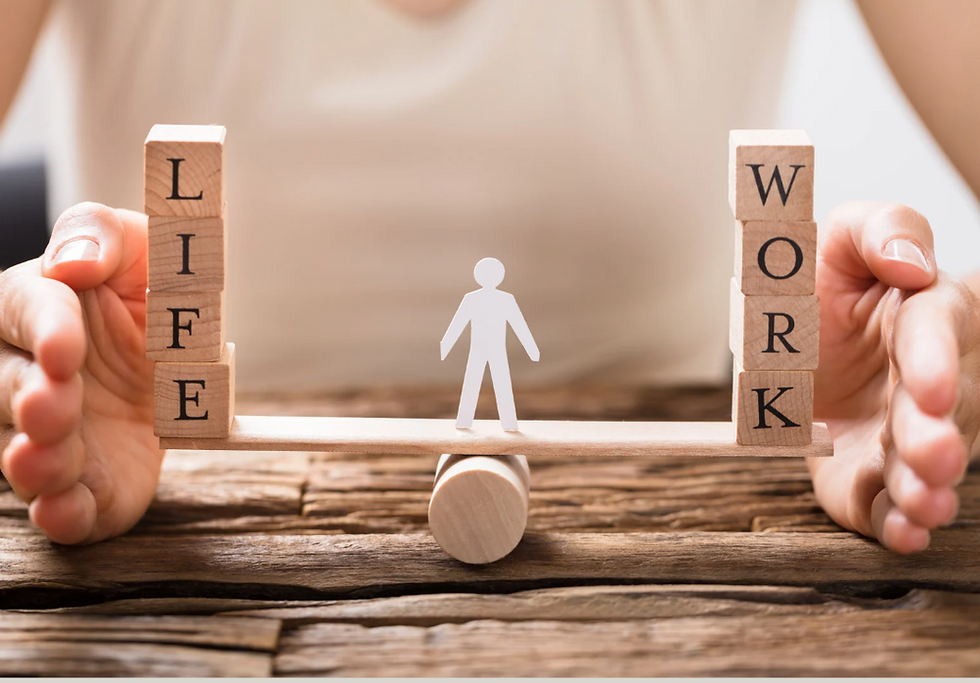The Go-Go-Go Trap: How Being “Always On” Messes with Your Body, Brain, and Family
- Kim Samari

- Jul 28, 2025
- 4 min read
Updated: Aug 30, 2025

If you’re a high-achiever constantly juggling work, emails, and responsibilities—it’s easy to fall into the trap of being “always on.” I see it all the time with my clients. Somewhere along the way, hustle culture convinced us that nonstop productivity is the key to success.
We check our phones before we even roll out of bed, squeeze in meetings over lunch, and fall asleep thinking about tomorrow’s to-dos. But here’s the hard truth: living in go-go-go mode isn’t just exhausting—it’s slowly wearing down your body, your brain, and your most important relationships.
As a health coach, I’m here to help you work with your body instead of burning it out. Let’s take a look at how constant connectivity affects your health—and more importantly, what you can do to reset.
How Overworking Affects Your Physical Health
If you regularly hit Friday night feeling like you’ve been flattened, you’re not imagining it. That level of exhaustion isn’t normal—it’s a red flag your body is waving loud and clear.
Your Heart is Under Pressure
Working long hours—especially over 55 hours a week—has been linked to an increased risk of heart disease, high blood pressure, and stroke. Chronic stress triggers inflammation and puts your cardiovascular system in overdrive.
A Struggling Metabolism
When you’re always on the move, your nutrition and physical activity tend to take a back seat. Skipping meals, reaching for convenience foods, and being glued to a desk can lead to blood sugar imbalances, weight gain, and metabolic disruption.
Weakened Immune System
Chronic stress suppresses immune function. If you’re getting sick more often or struggling to recover from everyday colds, your stress levels may be to blame.
Muscle Tension and Pain
Tight shoulders, tension headaches, stiff necks—sound familiar? Sitting too long, clenching your jaw, and never stretching out leads to physical tension that builds up over time.
Poor Sleep Quality
If you find yourself lying awake at night unable to shut your brain off, that’s your nervous system still stuck in overdrive. And when you’re not sleeping well, everything from your energy to your mood starts to unravel.
Burnout Symptoms and Mental Fatigue
Your brain isn’t a machine—it needs rest and recovery just like your body. Here’s how mental overload shows up:
Burnout Goes Beyond Feeling Tired
Burnout is a state of emotional, physical, and mental exhaustion. It can leave you feeling detached, unmotivated, and like you're just going through the motions every day.
Anxiety and Mood Swings
When there’s no breathing room in your schedule, stress builds up and contributes to anxiety, irritability, and even depression. Your mind needs downtime to reset and regulate.
Mental Fog and Decision Fatigue
Struggling to focus? Forgetting things? Overthinking even small decisions? That’s a clear sign your brain is overstimulated and under-rested.
How Work Stress Impacts Your Relationships
Even if you think you’re handling your stress internally, the people closest to you are likely feeling its effects.
Present But Not Engaged
Physically at home but mentally still working? Your partner, kids, or loved ones can feel that disconnection. Over time, it weakens your emotional bond.
Short Tempers and Frustration
When you're overstretched and running on fumes, you’re more likely to snap or argue—even over small things. This kind of reactive energy creates tension at home.
Surface-Level Conversations
It’s hard to have deep, meaningful conversations when your mind is in a constant state of stress. Emotional intimacy fades when there’s no room for real connection.
Kids Can Sense It
Children are incredibly intuitive. When you’re mentally checked out, they notice. It can affect their emotional security, behavior, and even performance at school.
Relationship Strain
Chronic stress and fatigue can lead to decreased intimacy and communication in romantic relationships. Without intentional time and attention, distance builds.
Work-Life Balance Isn’t a Luxury—It’s a Necessity
Let’s get this straight: protecting your mental and physical health is not optional. Work-life balance is critical if you want to feel energized, connected, and fulfilled—not just survive the day. That doesn’t mean you need to quit your job or disappear into the mountains (though that does sound kind of nice). It means being intentional with your energy, time, and priorities.
Here are five work-life balance strategies I share with my coaching clients:
Set real boundaries. Turn off notifications, log off after work, and protect your evenings.
Take guilt-free breaks. Rest is productive. You don’t have to earn it.
Prioritize daily movement and meals. Small, consistent actions go a long way.
Create a wind-down routine. Protect your sleep with a no-phone bedtime buffer.
Be fully present at home. Even 20 focused minutes with loved ones can deepen connection.
Your Small Step Starts Now
You don’t need to overhaul your whole life to feel better. Start with one small change—a boundary, a walk, a mindful meal—and build from there.
What’s one thing you can do this week to protect your energy and improve your work-life balance? Share it in the comments—I’d love to hear what you're working on and cheer you on.
Looking for More?If you're curious about the science behind these mind-body connections, check out the research sources I’ve linked below.
Burnout, Anxiety & Depression:
Maslach, C., et al. (2001). Job burnout. Annual review of psychology.
Virtanen, M., et al. (2018). Long working hours and risk of incident depression: the IPD-Work Consortium meta-analysis. Journal of the American Heart Association.
Work-Life Balance & General Health/Well-being:
Guest, D. E. (2002). Perspectives on the study of work-life balance. The International Journal of Management Reviews.
Impact on Family & Children:
Grzywacz, J. G., & Marks, N. F. (2000). Family, work, and mental health: an inquiry into the everyday lives of employed parents. Journal of Health and Social Behavior.
Physical Health Links (stress-health general):
Roesler, U., & Ehinger, J. (2015). Work-related stress, strain, and health problems: A systematic review. Journal of Occupational Health Psychology.



Comments